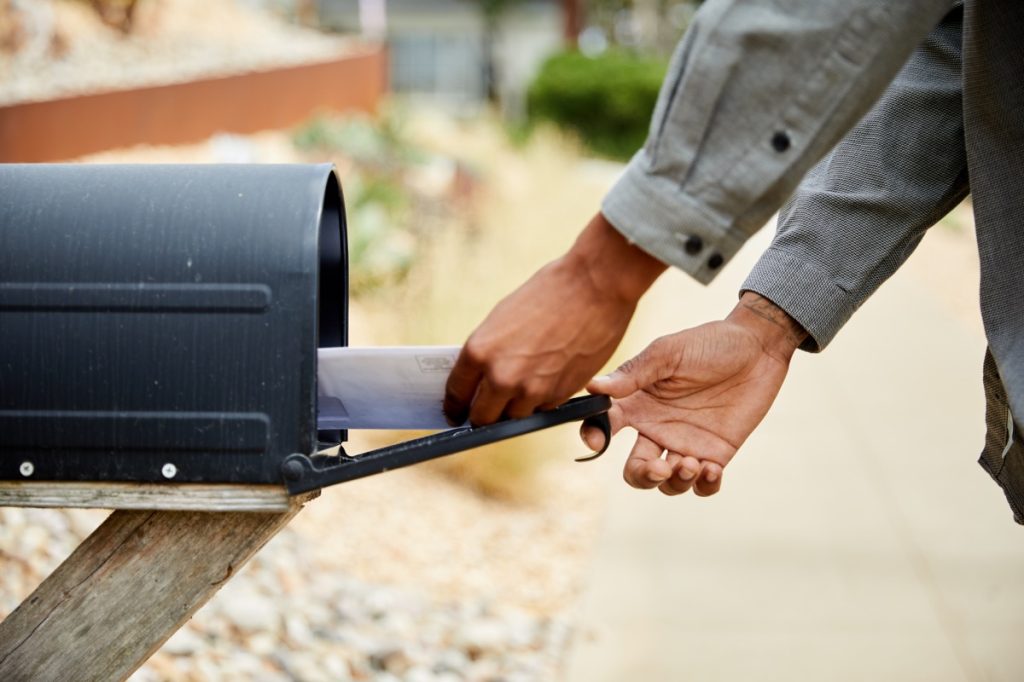New Home Warranty Scam Looks So Real It Keeps Fooling People, Insurers Warn
Don't fall victim to these seemingly authentic letters making the rounds.

New technology has given scammers myriad ways to target and lure in potential victims. However, there are still plenty of traditional tactics criminals use that don't involve your smartphone or email. Some have even reverted to using traditional phone calls or letters sent through the mail to steal money and information. And now, a new home warranty scam is making the rounds that looks so real it keeps fooling people. Read on to see why insurers are warning the public about this latest swindle attempt.
READ THIS NEXT: If You Get a Call From This Number, Hang Up Immediately, Police Say in New Warning.
A new type of home warranty scam making the rounds can appear remarkably convincing.

The barrage of junk text messages and emails most people receive on any given day may have made us more skeptical of unsolicited messages on our devices. But just as new forms of communication continue to see new types of attempted identity theft, a current home warranty scam is relying on an authentic-looking letter that gets sent right to your front door.
The latest grift appears as a mailed notice warning that a customer's home warranty has expired or is about to expire, local Rochester, Minnesota NBC affiliate KTTC reports. The outside of the envelope may even be printed with an urgent message in red text, pressing the letter's importance or suggesting an affiliation with a bank or financial institution.
In many cases, the enclosed letter makes it appear as though the company contacting the addressee is somehow connected to their homeowner's insurance company or even their county's deed office. The letter often states that it's a final notice before a policy expires, leaving the residents on the hook to pay for any repairs. Some notifications can even include a photo of the targeted home printed on a return envelope requesting an immediate fee payment, tricking some into thinking the request is authentic, the Southern Maryland Chronicle reports.
Scammers might have access to information that can help them make their attempts look more believable.

Of course, the company contacting the homeowners with these types of letters has no connection whatsoever with their actual insurance company, no matter what they may imply. And now, residents have reported the convincing scam in multiple states, including Minnesota, Tennessee, Oregon, and Maryland.
Unfortunately, it's even easier for criminals to craft this scheme than many victims realize. "Some information about mortgages—such as the name of your lender and servicer—are public record and that information can be found online," the Tennessee Attorney General's Office warned in a press release on June 29. "These scammers use the name of your mortgage company in the letter to appear legitimate."
RELATED: For more up-to-date information, sign up for our daily newsletter.
Authorities say there's an easy way to tell when you're dealing with a likely scammer.

Since criminals will often use the information available to them to pick their victims, it's hard to avoid getting targeted. But authorities point out that there's one way you may be able to tell you're dealing with a fraudster.
"Solicitations that use threatening language or unnecessary urgency are almost always a scam," Oregon Attorney General Ellen Rosenblum said in a press release on Aug. 17. "If you are interested in purchasing a home warranty from a legitimate company, I encourage you to do your research—start by looking for warranty companies that service your neighborhood, ask friends and family for referrals, research what kind of coverage you need, compare coverage among companies, and pay attention to exclusions and limitations."
If you receive such a letter in the mail, authorities say you should either throw it away immediately or report it to law enforcement, KTTO reports.
You should beware of new scams that are becoming more sophisticated.

The burgeoning home warranty scam isn't the only seemingly legitimate hustle to make the rounds recently: A new sophisticated operation known as "callback phishing" is also becoming a problem. Authorities warn that the two-tier con starts with an email sent about an impending charge or renewing subscription prompting the target to call a sham customer service center staffed by criminals waiting to steal your private information.
Another scam also uses two levels of trickery to steal money and personal information from victims. In this case, a phony text message claiming to be a delivery notification for Amazon gets sent to a target requesting that they call a fake customer service agent to verify the charge. The scammer will then ask the potential victim to download a remote desktop software that will grant them access to your phone or computer, which they will then use to steal personal information or transfer funds, TechRadar U.S. reported. As always, officials said to be wary of any unsolicited messages or prompts—especially if they contain typos, grammatical mistakes, or press a sense of urgency to send money or complete a task.





















